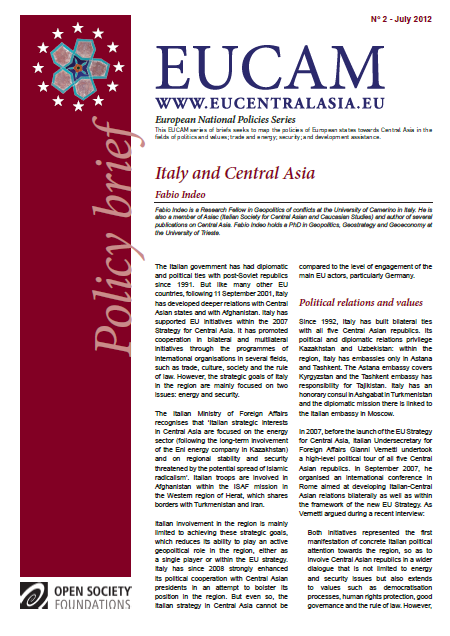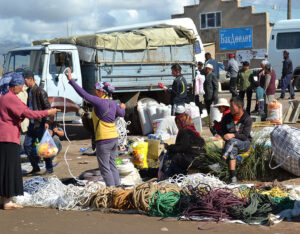European National Policies Series – Italy and Central Asia

The Italian government has had diplomatic and political ties with post-Soviet republics since 1991. But like many other EU countries, following 11 September 2001, Italy has developed deeper relations with Central Asian states and with Afghanistan. Italy has supported EU initiatives within the 2007 Strategy for Central Asia. It has promoted cooperation in bilateral and multilateral initiatives through the programmes of international organisations in several fields, such as trade, culture, society and the rule of law. However, the strategic goals of Italy in the region are mainly focused on two issues: energy and security.
The Italian Ministry of Foreign Affairs recognises that ‘Italian strategic interests in Central Asia are focused on the energy sector (following the long-term involvement of the Eni energy company in Kazakhstan) and on regional stability and security threatened by the potential spread of Islamic radicalism’. Italian troops are involved in Afghanistan within the ISAF mission in the Western region of Herat, which shares borders with Turkmenistan and Iran.
Italian involvement in the region is mainly limited to achieving these strategic goals, which reduces its ability to play an active geopolitical role in the region, either as a single player or within the EU strategy. Italy has since 2008 strongly enhanced its political cooperation with Central Asian presidents in an attempt to bolster its position in the region. But even so, the Italian strategy in Central Asia cannot be compared to the level of engagement of the main EU actors, particularly Germany.
Political relations and values
Since 1992, Italy has built bilateral ties with all five Central Asian republics. Its political and diplomatic relations privilege Kazakhstan and Uzbekistan: within the region, Italy has embassies only in Astana and Tashkent. The Astana embassy covers Kyrgyzstan and the Tashkent embassy has responsibility for Tajikistan. Italy has an honorary consul in Ashgabat in Turkmenistan and the diplomatic mission there is linked to the Italian embassy in Moscow.
In 2007, before the launch of the EU Strategy for Central Asia, Italian Undersecretary for Foreign Affairs Gianni Vernetti undertook a high-level political tour of all five Central Asian republics. In September 2007, he organised an international conference in Rome aimed at developing Italian-Central Asian relations bilaterally as well as within the framework of the new EU Strategy. As Vernetti argued during a recent interview:
Both initiatives represented the first manifestation of concrete Italian political attention towards the region, so as to involve Central Asian republics in a wider dialogue that is not limited to energy and security issues but also extends to values such as democratisation processes, human rights protection, good governance and the rule of law. However, this initiative has remained an isolated attempt, and the lack of continuity in this policy has contributed to hindering the Italian role of promoter of values as a single actor.
The Italian strategy aims to deepen political relations with Central Asian energy-rich nations, and in particular, Kazakhstan. Since 1992, there have been several high-level political meetings between representatives of Italy and Kazakhstan. These engagements have helped to develop bilateral cooperation and agreements in fields such as trade, cultural exchange and the fight against organised crime and illegal trafficking.
In November 2009, the Kazakh president, Nursultan Nazarbayev, met Italian government representatives in Rome. At that meeting, a Strategic Partnership Treaty was signed, in which Kazakhstan made a formal commitment to cooperating in the promotion of the rule of law and democratisation. As one official of the Italian Ministry of Foreign Affairs said, ‘in the last few years, there has been an intensification of high-level visits and meetings – such as the meetings in March and April 2012 in Astana between Italian Premier Monti and his Kazakh counterpart Masimov – which underline the Kazakh role as Italy’s main partner in the region’.
Italy has also developed political relations with gas-rich Turkmenistan. In 2009, Turkmenistan’s president, Gurbanguly Berdymukhammedov, made an official visit to Rome, raising hopes for Italian involvement in the exploitation of Turkmen gas reserves.
In spite of this growth in political relations, Italy seems unwilling to try to persuade Central Asian political leaderships to engage in constructive dialogue on the promotion of values like democracy and human rights. This is a consequence of its weak geopolitical weight in the region, a problem that even the EU as a whole faces in Central Asia. But Italy also believes that its security and energy objectives with authoritarian regimes can be better achieved by avoiding harsh criticism and refraining from making demands on issues relating to values.
Trade and energy
Trade relations between Italy and Central Asia reflect the complementarity of their economies. Italy imports raw materials, crude oil and refined products, while its exports to the region are mechanical and electronic equipment, clothing and footwear. According to 2010 data from the Italian Institute of Foreign Trade (ICE), Italian exports and imports with Central Asia have grown consistently, even though it has a sizeable trade deficit with the region. Due to its impressive economic growth and resources, Kazakhstan is Italy’s main trade partner in the region, accounting for 30 per cent of total Italian imports from Central Asia.
Italy also aims to strengthen economic cooperation with Uzbekistan, the most populous country and potentially the largest market in the region. In October 2011, Italian Undersecretary of State Catia Polidori made an official visit to the Tashkent Business Forum in an effort to involve Italian small and medium enterprises (SMEs) in the Uzbek economy. The main Italian companies operating in Kazakhstan are construction company Todini, cement producer Italcementi Group and energy company Eni. The industrial engineering company Techint operates in Uzbekistan and clothing firm Carrera is in Tajikistan. Several SMEs and well-known fashion and food companies such as Benetton and Lavazza also have interests in the region.
Italian energy company Eni has been active in Kazakhstan since 1992, and holds a strategic position in the energy sector there. Eni is a member of the North Caspian Operating Company (NCOC), the joint operating company in charge of the development of the Kashagan offshore oil and gas field in the Caspian Sea. According to the Eni development plan, Kashagan production should start at the end of 2012, and when operations come on stream, the field should produce 1.5 million barrels a day. The choice of the future export route for Kashagan resources will represent an interesting geopolitical step for the consortium. Currently, Eni is pushing to connect Kashagan production to the Baku-Tbilisi-Cehyan pipeline, through the implementation of the EU-backed Kazakhstan Caspian Transportation System. It is hoping to avoid Russian and Chinese options for export routes. Eni is the co-operator with British Gas of the Karachaganak Petroleum Operating (KPO) partnership company created to develop the Karachaganak oil, gas and condensate field: both companies hold a 32.5 per cent share. Eni predicts that gas production there could reach 16 billion cubic metres a year, which would make Kazakhstan an important gas supplier.
Since the acquisition of the British company Burren in 2008, Eni has consolidated its presence in Turkmenistan’s oil fields. In 2009, Eni signed a Memorandum of Understanding with Turkmenistan to promote and strengthen cooperation in the energy sector. The memorandum made Eni the second foreign company to win an onshore contract to develop Turkmen energy fields.
Eni’s participation in the South Stream consortium along with Gazprom shows that Italy is ready to support the rival Nabucco project, owing to the Eni-Gazprom strategic partnership, in conflict with the EU’s strategy of diversifying suppliers. However, difficulties in determining which gas suppliers will fuel the South Stream pipeline project could push Eni to take more interest in the development of the Southern Corridor. In 2010, Eni obtained formal Turkmen support for a project that would see compressed natural gas transported via tankers across the Caspian Sea to Azerbaijan. This project, if implemented, would effectively bring into being the Southern Corridor, even if the intention were less to address EU energy security concerns than to promote the South Stream project.
Security
Potential instability in Central Asia, caused by political and ethnic tensions between nations or the social and political consequences of authoritarian regimes, represents a threat to Italian trade and energy interests in the region. But Italy is not directly involved in ensuring stability in Central Asia. Its involvement in regional security in Central Asia is limited to its activities in Afghanistan within the NATO mission.
Since 2002, Italy has been an important partner of the ISAF mission in Afghanistan, deploying the fourth largest contingent, approximately 4,000 troops. Italian troops are mainly located in the Western region of Herat. Italy is involved in both hard and soft security initiatives in Afghanistan. Under the NATO umbrella, Italian troops are involved in military operations and in training the Afghan National Army. Italy is also cooperating on issues like governance and justice reform through multilateral organisations, such as UN agencies, the World Bank and other international organisations. According to Lieutenant-General Fabio Mini, ‘the Italian role in the Afghan security sphere is limited to presence participation, in order to strengthen the idea of cohesion of the international security organisations engaged in this area, which allows obtaining some economic and maybe geopolitical gains.’
In Central Asia, according to one official of the Ministry of Foreign Affairs, ‘Italy is mainly interested in obtaining transit deals with Central Asian states bordering Afghanistan, in order to resupply its troops by means of the Northern Distribution Network, considering the geographic proximity to Afghanistan’. Italy has developed broad military cooperation with Uzbekistan and is in the process of establishing cooperation with Kazakhstan. Both Central Asian countries have assigned a military attaché to their embassies in Rome.
In 1999, Italy and Uzbekistan signed an intergovernmental agreement on cooperation on defence issues, under which the two engage in periodic bilateral meetings. At the last meeting in 2010, Uzbekistan showed interest in buying Italian military vehicles and equipment. Italy has no defence cooperation with Kazakhstan, Turkmenistan, Kyrgyzstan or Tajikistan. But instating cooperation with Turkmenistan on military issues could be beneficial to Italian interests. In view of the proximity of the Turkmen border to the Afghan Herat region, Italy is attempting to reach a transit deal that would enable it to provide logistical support to its troops. However, Turkmenistan’s neutral status has held back the progress of this initiative. One official of the Italian Military Centre for Strategic Studies (CeMiSS, by its acronym in Italian) says ‘some chances for cooperation with the Ashgabat government could focus on the procurement sphere, following the interest expressed by Turkmen authorities (in the context of bilateral meetings) in buying military vehicles and assets made in Italy and in benefiting from military training’. The Italian government could also be open to the possibility of signing an agreement with Kazakhstan on cooperation on defence. Astana has shown interest in military equipment and in training its cadres in Italian academies, while Italy could obtain an additional supply route within the NDN framework.
Italy’s security focus in Central Asia remains mainly centred on the stabilisation of Afghanistan and on defence cooperation programmes and arms sales.
Development assistance
A worsening lack of funds has caused the Italian government to substantially exclude Central Asian republics from national development assistance programmes. In the multi-annual 2012-2014 strategic guidelines for Italian development cooperation, the Ministry of Foreign Affairs has further reduced the number of ‘priority countries’. Afghanistan continues to be included within this small group and benefits from development assistance.
In cooperation with the European Commission, Italy coordinates the EU regional initiative on environment and water in Central Asia. This programme is one of the three main EU regional initiatives for Central Asia and one of the seven pillars identified by the 2007 Strategy. The initiative was officially launched in Ashgabat in December 2008. As one official of the Italian Ministry of Foreign Affairs said:
Italian coordination and initiative achieved a significant result following the Third High Level Conference EU-Central Asia in Rome (November 2009), with the agreement for the realisation of a Joint Platform for Water and Environment Cooperation. Italy seeks to implement the European Union Water Initiative promoting cooperation and dialogue among Central Asian states on water management, which represents a significant step towards ensuring stability and security in the region.
However, besides organising initial high-level meetings, Italy has not achieved concrete results in tackling and solving water management issues in Central Asia. Italy is not able to exercise political suasion that could reconcile conflicting strategic interests between downstream and upstream countries. Other EU countries, such as Germany, Finland and Romania, are playing a more active role in coordinating water initiatives, causing Italian efforts to be marginalised. In view of the absence of progress in Central Asian water initiatives, the EU should consider promoting broader cooperation involving crucial non-European states as well as the big international donors such as the ADB, the World Bank, and so on. Meanwhile, Italy should consider whether it really wants to coordinate the existing water initiative that has done little more than talk about the issue.
Italy supports several programmes implemented by international organisations in the region. The World Health Organisation provides financial support for children and women in Kazakhstan, Tajikistan and Uzbekistan. The UNDP has a programme to distribute medical supplies in the Kyrgyz region of Issyk-kul. And UNICEF is working to reduce infant mortality in the region. Through financial support to NGOs, Italy has contributed to delivering food aid in the Autonomous Republic of Karakalpakstan in Uzbekistan. It has also helped improve water access, social and health care in the Tajik region of Khatlon. This programme is implemented by the Italian organisation, CESVI, which has been active in Tajikistan since 2001. But overall, Italian support to and cooperation with Central Asian civil society is limited, and few organisations have participated in initiatives in the region.
In the academic sphere, the recent establishment of the Turin Polytechnic University in Tashkent represents an opportunity to deepen cultural and academic relations, and could also help Italy extend its soft power in the region. In Kazakhstan, the universities of Perugia and Reggio Calabria offer Italian language courses to some Kazakh counterparts. And since 1999, Italy has supported archaeological cultural and scientific missions through excavations in the Kyzyl Orda region of southern Kazakhstan and in Samarkand in Uzbekistan.
Italian initiatives seem weak and somewhat directionless when compared to projects undertaken by other EU member states, which have established a profitable combination of national government support and private initiatives.
Conclusion
In the coming years, Italy’s main engagement in Central Asia will focus on the traditional spheres of energy and security interests. The effects of the economic crisis will weaken Italian initiatives in trade and in democracy promotion, such as, for example, the planned implementation of the OSCE Programme to train electoral observers. Consequently, Italy will mainly participate in Central Asia within the EU strategy framework.
On security in the region, Italy will likely support EU initiatives after the planned NATO withdrawal from Afghanistan in 2014. The Afghanistan withdrawal is the cause of some concern regarding regional stability and security. One official of the Italian Ministry of Foreign Affairs said that ‘Italy will support border management initiatives in Central Asian states bordering Afghanistan, in order to prevent regional instability after the NATO departure and to fight against terrorism and drug trafficking.’
On the energy front, Italy should harmonise its energy objectives with the EU-27 energy security strategy. This could be achieved through the successful implementation of energy cooperation with Turkmenistan, as well as through Eni’s efforts to realise the Southern corridor, which would enhance the economic and geopolitical feasibility of the Nabucco project.
As one official of the Ministry of Foreign Affairs argued:
Even if security and energy issues remain strategic issues in the national approach to Central Asia, Italy should through the EU strategy framework play an active role in other fields, such as the promotion of the socio-economic development of the region, and strengthening the internal economic environment in order to attract growing foreign investments.
It is to be hoped that Italy will play an active role to strengthen broader European engagement within EU structures – because direct activities in the region in the coming years are likely to decline from an already low base.
Download “European National Policies Series - Italy and Central Asia” EUCAM-National-Policies-Series-2.pdf – Downloaded 445 times – 605.86 KB


![shutterstock_1240181551 [Omgezet]](https://eucentralasia.eu/wp-content/uploads/2024/10/shutterstock_1240181551-Omgezet-300x248.jpg)



